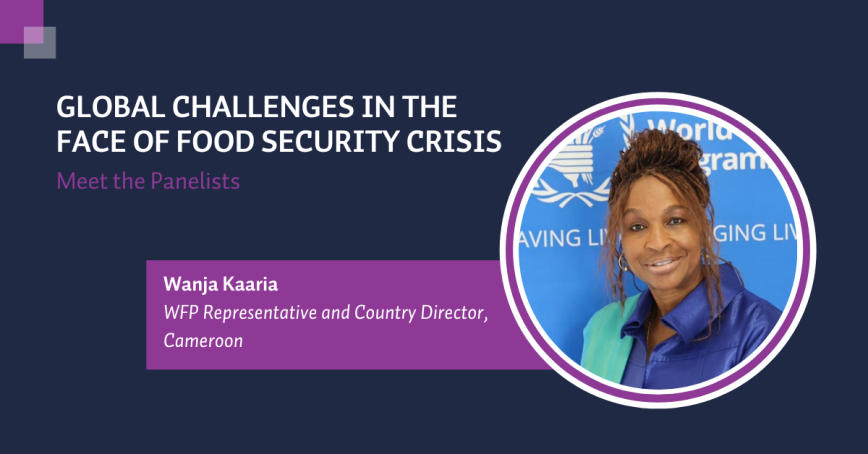Meet the panelist: Wanja Kaaria on food security in Cameroon

Meet Wanja Kaaria, the World Food Program representative and country director of Cameroon and Sao Tome & Principe. She’s one of three World Food Program Leaders speaking at the Sept. 6 event, Global Challenges in the Face of Food Security Crisis, happening both in person and online. We asked her to share more of what we can expect from that conversation.
Q: Can you provide an overview of the current food security situation in Cameroon?
Cameroon faces severe food insecurity with about 2.4 million – or about 10 per cent of the population – affected. More than 74 per cent of the acutely food insecure reside in six crisis-affected regions due to conflicts, including separatist and Boko Haram conflicts, along with climate change effects. This situation led to more than one million internally displaced persons, 470,000 refugees and 800,000 vulnerable households hosting displaced populations. COVID-19 has worsened these challenges. Rising costs due to the Ukraine crisis have driven up food and fuel prices.
Q: The UN World Food Program provides food assistance to those affected by shocks such as violent conflict and the effects of climate change. How does the WFP navigate these complexities and balance the need for emergency food assistance with longer-term development goals?
WFP faces the delicate balance between providing lifesaving assistance in the hours and days preceding a shock, whether it is conflict, floods, that displaces households, or an increase in the prices of basic goods. WFP has outlined a transition pathway to define criteria for moving the most vulnerable households from unconditional humanitarian assistance to activities that aim to build their resilience – developing climate-smart community assets, investing in income-generating activities, and increasing the productivity of smallholder farmers – so that the humanitarian needs are reduced, and people are more self-reliant.
Q: What’s the connection between education and food security in fostering long-term improvements to hunger and malnutrition?
The connection between education and food security in tackling hunger and malnutrition is significant. In Cameroon, 1.4 million children need educational help, and providing school meals plays a key role in improving school enrollment and learning. WFP and the government collaborate to offer school feeding programs, but only 3.7 percent of kids get regular meals. Yet, research shows that food security affects education and health. Childhood food insecurity leads to malnutrition, linked to poor cognitive growth and lower educational success. The World Bank, UNICEF, UNESCO, and WFP all highlight the links between illiteracy, lack of education, and poverty. Strengthening cognitive skills through quality education supports economic growth. Addressing food security holistically is vital for a child's cognitive and physical development.
Q: In your experience, what are some of the most common misconceptions or stereotypes about humanitarian work, and how do you address them?
Perhaps a misconception that people may have is that WFP only distributes food to hungry people after conflict or a natural disaster. While this is certainly the core of WFP’s work, we provide a comprehensive package of support, including extensive support to local economic development by improving the productivity of smallholder farmers to feed their community, equipping humanitarian partners to reach hard to access areas to ensure our lifesaving support gets to those most in need (UNHAS), providing nutritious food and teaching communities about healthy lifestyles to fight malnutrition (SBCC). These are just a few examples amongst many when it comes to WFP’s broad range of work.
We also try to debunk the misconception that a humanitarian response or humanitarian assistance alone can solve the world’s pressing problems when it comes to fighting hunger and malnutrition. As humanitarians, we work closely with local communities to address underlying causes of hunger. Human assistance alone is not enough to address these problems, instead a concerted effort on behalf of governments, civil society, humanitarian and development partners, is needed to reach an ambitious goal of Zero Hunger.
Q: How is climate change affecting Cameroon, especially in relation to crises and food security?
Cameroon has experienced the devastating impacts of climate change at the back of numerous crises. We can visibly see that climatic shocks are increasing in frequency and intensity, which is exacerbating food insecurity, undermining agricultural sustainability and negatively impacting people’s livelihoods. Climate change is also driving inter-communal clashes in Cameroon. There have been over six in the last two years.
Communities most vulnerable to climate extremes often face limited access to climate information, which impede their ability to prepare for climate hazards. WFP is therefore working closely with the Government to reinforce their capacity to collect, analyse and disseminate data to these communities so they are better able to respond and manage the shocks.